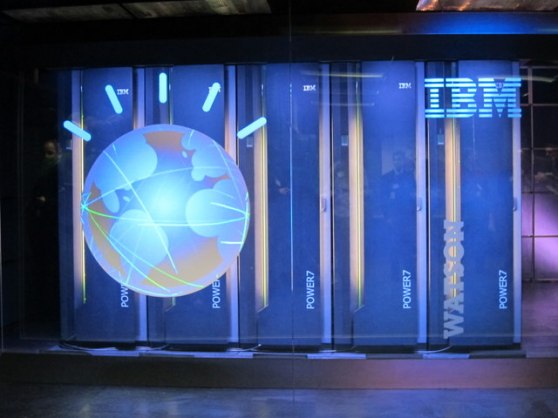What do ATM machines, the Universal Barcode system and a fact-finding computer that won jeopardy have in common?
[aditude-amp id="flyingcarpet" targeting='{"env":"staging","page_type":"article","post_id":601958,"post_type":"story","post_chan":"none","tags":null,"ai":false,"category":"none","all_categories":"big-data,business,enterprise,entrepreneur,","session":"B"}']According to an IBM spokesperson, these inventions began with a patent secured by the company’s scientists. For the 20th consecutive year, the computer services company has held its ground as the king of patents — it acquired 6,478 in 2012.
This is in no small part due to increasing contributions from research teams abroad. Nearly 30 percent of IBM’s patients were produced by researchers outside of the U.S., an eight percent jump from 2010. Israel, Japan, Canada, and Germany are among the company’s most productive countries.
AI Weekly
The must-read newsletter for AI and Big Data industry written by Khari Johnson, Kyle Wiggers, and Seth Colaner.
Included with VentureBeat Insider and VentureBeat VIP memberships.
According to Efrat Kasznik, president of Silicon Valley based IP consulting firm Foresight Valuation Group, IBM has a lot of patents for three main reasons: it has been around for a long time, it invests billions of dollars annually in R&D, and it has an elaborate incentive system for its researchers to file for patents.
This year, IBM’s patent count exceeded the combined totals of Accenture, Amazon, Apple, EMC, HP, Intel, Oracle, and Symantec. On the top 10 list (see below), Asian technology giants like Samsung and Hon Hai are buying up thousands of patents. “This trend has major implications for US companies [with] foreign companies are entering the US patent market,” said Kasznik.
Racking up patents is a smart strategy. It yields about $1 billion per year in licensing revenue and reduces the risk of being sued as the company moves into new territory, such as analytics and “big data.”
Big data is a buzzword used to describe the growing volume, complexity, and variety of data companies are accumulating. With global research firm Gartner projecting that big data will help drive IT spending to $3.8 trillion in 2014, it’s no surprise that IBM is making moves in this space.
According to IBM, 300 of the patents secured this year would foster innovation in the emerging big data analytics market. The company has made a name for itself in the field with its machine learning patented invention, which was implemented in “The Watson system”, a smart question-answering computer. In October, Watson hit the headlines for securing a place at medical school, where it was fed test questions from the United States Medical Licensing Exam. As VentureBeat reported, Watson is currently being positioned as a smarter successor to Apple’s Siri.
Since 1993, the company has received nearly 67,000 patents. It currently boasts a team of about 8,000 scientists residing in 35 countries.
[aditude-amp id="medium1" targeting='{"env":"staging","page_type":"article","post_id":601958,"post_type":"story","post_chan":"none","tags":null,"ai":false,"category":"none","all_categories":"big-data,business,enterprise,entrepreneur,","session":"B"}']
“Most concretely, our 2012 patent record and the two decades of leadership it extends are a testament to thousands of brilliant IBM inventors — the living embodiments of our devotion to innovation that matters, for our clients, for our company, and for the world,” said Ginni Rometty, IBM’s chairman and CEO in a statement.
According to IFI Patent Services, the top patent-acquirers in 2012 are as follows:
VentureBeat's mission is to be a digital town square for technical decision-makers to gain knowledge about transformative enterprise technology and transact. Learn More

